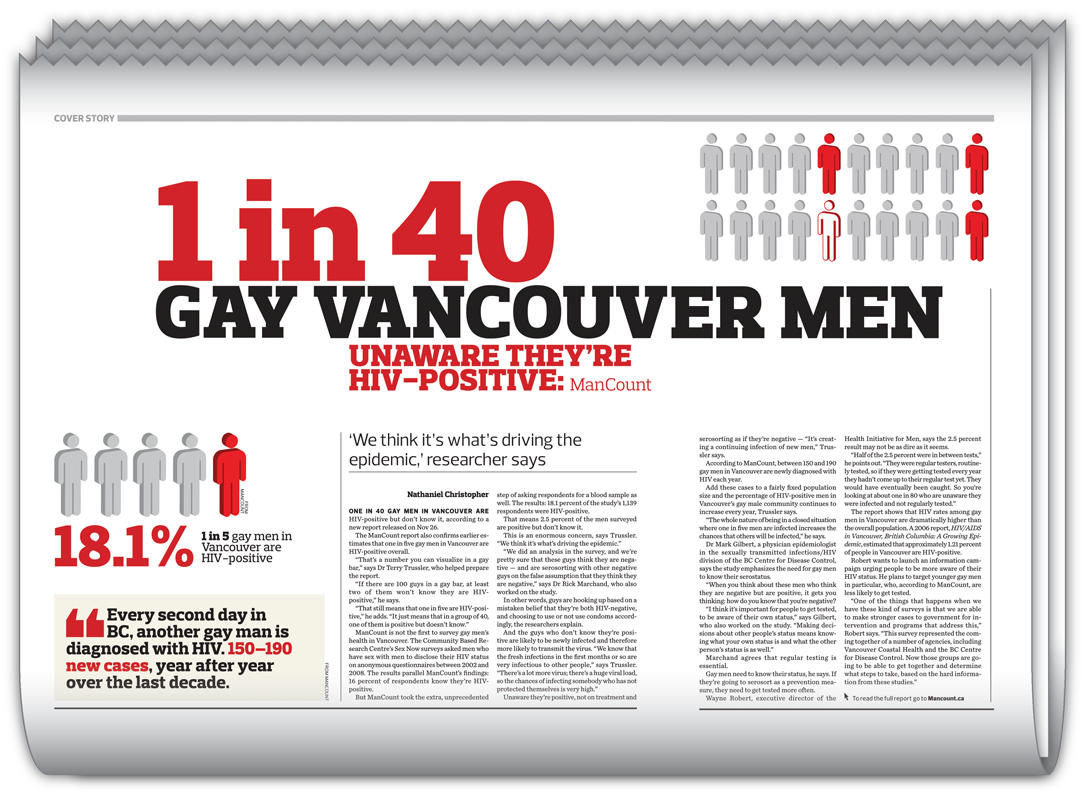1 in 40 gay Vancouver men unaware they’re HIV-positive: ManCount
'We think it's what's driving the epidemic,' researcher says

One in 40 gay men in Vancouver are HIV-positive but don’t know it, says a new report scheduled for release on Nov 26.
The ManCount report also confirms earlier estimates that one in five gay men in Vancouver are HIV-positive overall.
“That’s a number you can visualize in a gay bar,” says Dr Terry Trussler, who helped prepare the report.
“If there are 100 guys in a gay bar, at least two of them won’t know they are HIV-positive,” he says.
“That still means that one in five are HIV-positive,” he adds. “It just means that in a group of 40, one of them is positive but doesn’t know.”
ManCount is not the first survey of gay men’s health in Vancouver. The Community Based Research Centre’s Sex Now surveys asked men who have sex with men to disclose their HIV status on anonymous questionnaires between 2002 and 2008. The results parallel ManCount’s findings: 16 percent of respondents know they’re HIV-positive.
But ManCount took the extra, unprecedented step of asking respondents for a blood sample as well. The results: 18.1 percent HIV-positive.
That means 2.5 percent of the men surveyed are positive but don’t know it.
This is an enormous concern, says Trussler. “We think it’s what’s driving the epidemic.”
“We did an analysis in the survey and we’re pretty sure that these guys think they are negative — and are serosorting with other negative guys on the false assumption that they think they are negative,” says Dr Rick Marchand, who also worked on the study.
In other words, guys are hooking up based on a mistaken belief that they’re both HIV-negative and choosing to use or not use condoms accordingly, the researchers explain.
And the guys who don’t know they’re positive are likely to be newly infected and therefore more likely to transmit the virus. “We know that the fresh infections in the first months or so are very infectious to other people,” says Trussler. “There’s a lot more virus, there’s a huge viral load, so the chances of infecting somebody who has not protected themselves is very high.”
Unaware they’re positive, not on treatment and serosorting as if they’re negative — “It’s creating a continuing infection of new men,” Trussler says.
According to ManCount, 150-190 gay men in Vancouver are newly diagnosed with HIV each year.
Add these cases to a fairly fixed population size and the percentage of HIV-positive men in Vancouver’s gay male community continues to increase every year, Trussler says.
“The whole nature of being in a closed situation where one in five men are infected increases the chances that others will be infected,” he says.
Dr Mark Gilbert, a physician epidemiologist in the sexually transmitted infections/HIV division of the BC Centre for Disease Control, says the study emphasizes the need for gay men to know their serostatus.
“When you think about these men who think they are negative but are positive, it gets you thinking: how do you know that you’re negative?
“I think it’s important for people to get tested to be aware of their own status,” says Gilbert, who also worked on the study. “Making decisions about other people’s status means knowing what your own status is and what the other person’s status is as well.”
Marchand agrees that regular testing is essential.
Gay men need to know their status, he says. If they’re going to serosort as a prevention measure, they need to get tested more often.
Wayne Robert, executive director of the Health Initiative for Men, says the 2.5 percent result may not be as dire as it seems.
“Half of the 2.5 percent were in between tests,” he points out. “They were regular testers, routinely tested, so if they were getting tested every year they hadn’t come up to their regular test yet. So they would have eventually been caught. So you’re looking at about one in 80 who are unaware they were infected and not regularly tested.”
The report shows that HIV rates among gay men in Vancouver are dramatically higher than the overall population. A 2006 report, “HIV/AIDS in Vancouver, British Columbia: A Growing Epidemic,” estimated that approximately 1.21 percent of people in Vancouver are HIV-positive.
ManCount shows that 18.1 percent of gay men in Vancouver are HIV-positive.
Robert wants to launch an information campaign urging people to be more aware of their HIV status. He plans to target younger gay men in particular who, according to ManCount, are less likely to get tested.
“One of the things that happens when we have these kind of surveys is that we are able to make stronger cases to government for intervention and programs that address this,” Robert says. “This survey represented the coming together of a number of agencies, including Vancouver Coastal Health and the BC Centre for Disease Control. Now those groups are going to be able to get together and determine what steps to take based on the hard information from these studies.”
